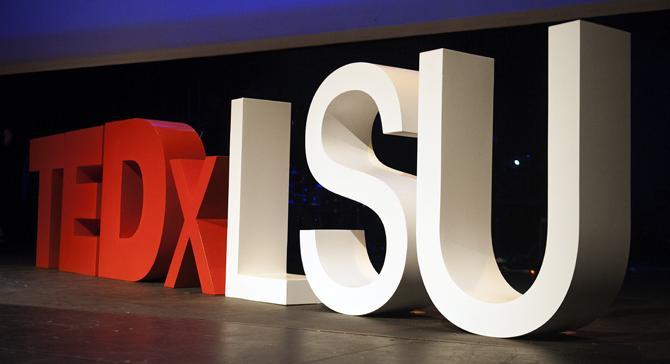The best TED Talks focus on original content through monologues and knowledgeable speakers, and TEDxLSU tried its best to live up to that standard in its second year on campus.
Jacqueline Stephens, director of Basic Research at Pennington Biomedical Research Center, used her presentation to discuss scientific research as a cathedral of human thought, noting that all knowledge builds on itself for thousands of years and provides context for other areas of science.
According to Stephens’ words, each presentation offered something valuable, even if it wasn’t obvious at the time.
But I’m still not sure how owner of Flaming Lotus Jewelry Lauren Collignon’s presentation, which centered on the idea that “everything is bananas, all the way down,” was supposed to enlighten us.
Collignon’s lighthearted dance and her talk of the shenanigans of a banana-suited duo defined her as the entertainment piece, and it came off as mocking privilege.
Her privilege to be on a stage with a rapt audience should’ve seemed more important, and her point about the insanity of life is valuable. But the way she presented made it seem like a poorly rehearsed joke.
Most everyone in TEDxLSU’s crowd was older and upper class. They were keen on raising awareness and then heading home, a good day’s work finished after listening to 19 people lecture at them for five hours. To them, the bananas seemed delightful.
Some students attended as well, which is impressive considering the student ticket fee was $50.
As Rebecca Burdette, event manager, mentioned after the event concluded, that’s much less than the ticket price of some official TED talks — those climb to the $2,500 range.
I understand the event needs to earn money, but the cost ends up barring many community members who might otherwise attend.
Instead of feeling like true communication with the Baton Rouge public, TEDxLSU felt like a short update for those who prefer to dip their toes into social involvement once a year.
It was slacktivism at its finest — a Ponzi scheme wherein this year’s fees pay for the next year’s event and so on — until the whole TEDx nation consumes itself.
The theme of this year’s event was “Prepare to Enact,” which entailed taking lessons beyond the Shaver Theatre and not focusing on the shortness and inadequacy of presentations.
But the way it turned out, if enact really means “convincing audience members to donate money, remember capitalism above all else and focus on job creation,” then it went well.
At least half the speakers wouldn’t have been out of place at a Louisiana business conference.
The motivations behind the event are noble, and starting conversations about community issues is important. Like one presenter, Bryan McCann, assistant professor of Rhetoric and Cultural Studies, mentioned straight from the TED slogan, “By using this platform — to promote ideas worth spreading — let’s use conversations after this talk to enact.”
McCann had the right idea, along with some of the other presenters. I heard conversations during the breaks that reached deeper than typical friendly debates, and that’s something that doesn’t happen often enough amid social norms about politeness.
IBM manager of Talent Development Dima Ghawi had it right, though, when she came on stage holding a glass vase. She shattered the vase at the end of her talk, urging audience members to take risks with their own vases.
That risk is what this year’s talks lacked. Most points came across as vanilla, and many speakers followed what seemed to be templates for presentation.
The unnerving underlying tone stressed assimilating in a society that sets marginalized people up for failure, and I expected more from a poverty-based and classist University town full of radical thinkers.
There were exceptions. Baton Rouge Youth Coalition leader Dominique Ricks shut the crowd up for a blessed five minutes with a poem about racism.
The first student to present also spoke, opening the door to other, greater student contributions beyond the volunteer positions they already hold.
TEDxLSU begged for more of these mold-breaking presentations, and I hope next year they’ll focus on new perspectives instead of the same stale ideas found in self-help books.
Megan Dunbar is a 20-year-old English senior from Greenville, SC.
Opinion: TEDxLSU doesn’t live up to its potential
By Megan Dunbar
March 30, 2014
TED Talks were held at the Shaver Theatre on Saturday, March 29, 2014 to speak to an audience about dynamic social, civic, and commercial efforts and ideas to inspire positive change for Louisiana and its citizens.
More to Discover








